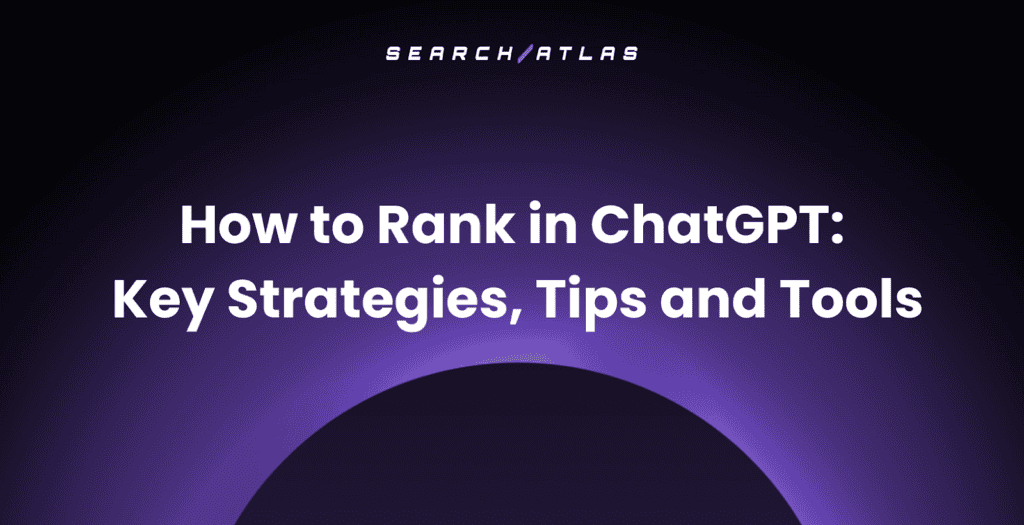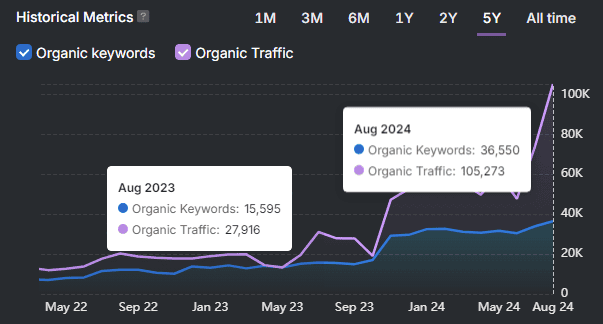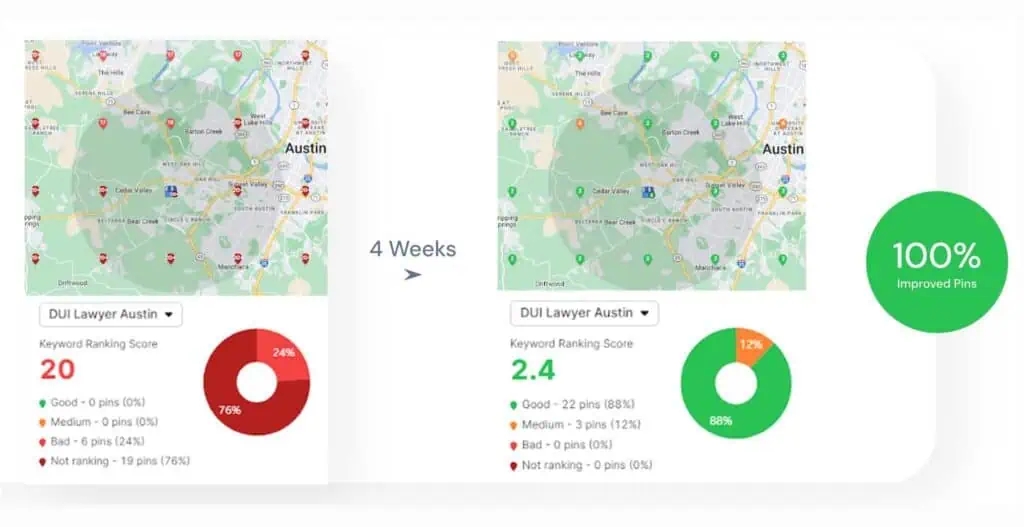SpyFu is a competitor research and keyword analysis tool that uncovers rival SEO and PPC strategies using historical data. It offers keyword overlap analysis, ad history tracking, backlink prospecting, and AI features like SpyGPT and RivalFlow for identifying content gaps.
Pricing ranges from $39 per month to $79 per month with unlimited searches. Users appreciate its affordability, strong PPC insights, and user-friendly interface. However, SpyFu lacks in-depth backlink analysis, comprehensive SEO audits, and real-time rank tracking. It functions best as a specialized competitor research tool and often requires use alongside other SEO platforms.
What is SpyFu?
SpyFu is a competitive intelligence platform designed to reverse-engineer competitor strategies by providing access to historical keyword data, ad copy, campaign history, and backlink information.
The platform’s functionality centers around competitor keyword research that reveals all organic and paid keywords with traffic estimates, ad history, and split testing capabilities that display Google Ads campaigns and performance data, and backlink outreach tools that identify link sources with contact information.
SpyFu includes a keyword gap finder that reveals targeted keywords users are missing, custom reporting features, and RivalFlow AI that uses artificial intelligence to identify SEO content gaps and generate optimized articles.
What is the History of SpyFu?
SpyFu was founded in 2005 by Mike Roberts in Scottsdale, Arizona. The SpyFu company emerged from Roberts’ background in technology consulting. Roberts had previously founded Velocityscape in 1999, a technology and management consulting firm.
Roberts developed SpyFu during his spare time. The tool was designed to convert Google Ads data and Google search results into insights for developing PPC and SEO strategies. In 2010, Roberts introduced Recon Files as an addition to SpyFu’s offerings.
Who is SpyFu for?
The platform serves SEO and PPC marketers who need to analyze competitor performance to identify ranking gaps, paid search opportunities, and link-building prospects within their market niche. Its interface and affordability make it suitable for SEO beginners, freelancers, and small to mid-size businesses.
What are the SpyFu Features?

The 9 SpyFu features are explained below.
1. SEO Competitor Research
SpyFu tracks competitor SEO strategies with real-time ranking data that updates every 5 seconds. The platform indexes over 73 billion results across 123 million domains to provide competitor intelligence.
The tool shows competitor keywords, ad copy, and backlink sources. Users see detailed metrics for thousands of competitor keywords, including seasonal search volume changes and profitability estimates based on clicks and cost-per-click data. SpyFu identifies your closest competitors and tracks which domains rank for your target keywords.
The system displays competitor rank history to show growth patterns and performance drops. SpyFu marks Google algorithm updates on timeline charts so users see how updates affect competitor rankings. The platform tracks competitor performance on new keywords and shows their recent keyword gains and losses.
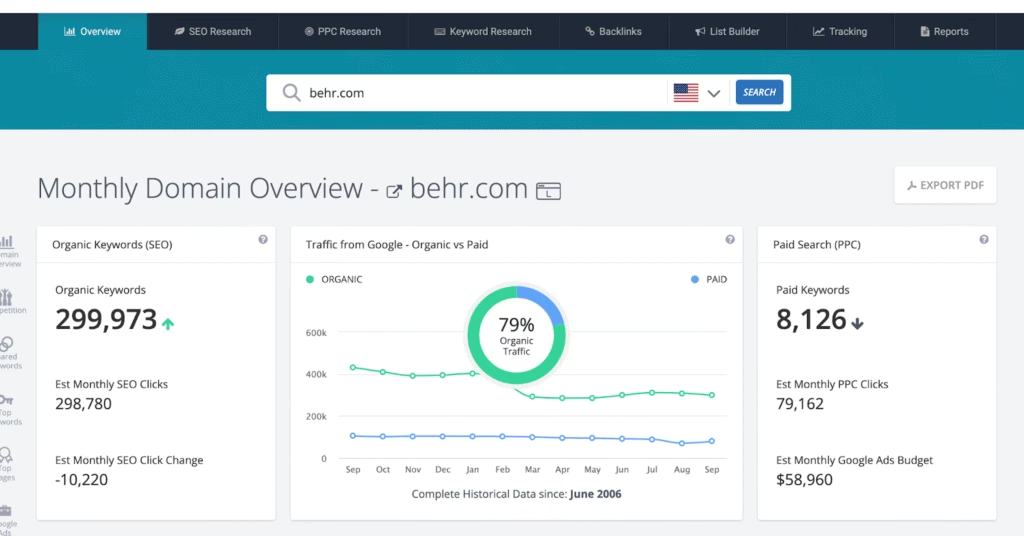
Users get lists of competitor content that ranks well and generates clicks, sorted by performance. This shows which competitor pages to study and replicate. The tool identifies long-tail keywords that competitors target but users might miss.
To use the feature, users enter competitor domains into SpyFu. The platform creates reports showing competitor keyword lists, rankings, and traffic estimates. Users review the top-performing competitor content and analyze which keywords drive their success. The timeline view shows ranking changes over time, and algorithm update markers help explain ranking drops or gains. Users export competitor keyword data and add profitable keywords to their own SEO strategy. The backlink section shows where competitors get their links, which users target for their own link-building efforts.
2. PPC Competitor Research
SpyFu PPC research tools show you what competitors do with Google Ads. You search competitor websites and download their keywords. The tool shows click numbers and costs for each keyword. SpyFu tracks all websites that bid on your keywords and alerts you when competitors change their strategies.
The platform compares your website to competitors and finds keywords that they buy that you do not. SpyFu analyzes competitor bidding histories and suggests profitable keywords. You see complete campaign histories, including ad tests and keyword performance over time. SpyFu finds wasteful keywords in your campaigns by checking what competitors tried and failed. The tool suggests negative keywords to stop wasting money.
You get better returns when you copy successful competitor strategies instead of guessing. SpyFu shows keywords that already work and make money.

SpyFu stops you from bidding on bad keywords before you waste money. You avoid mistakes competitors have already made. The tool lets you optimize campaigns using competitor data instead of trial and error.
3. Keyword Research
SpyFu provides keyword research with simplified difficulty scoring and comprehensive metrics, including historical position, volume, and cost data. Users switch between preset SEO and PPC views based on campaign focus.
The platform filters keywords by search intent through dropdown selections. Users choose “Transactional Keywords” for conversion optimization or “Questions” to identify searcher queries about core topics. SpyFu presents related keywords in question format and automatically organizes them into topic groups that expand from broad themes into detailed subtopics. This structure supports comprehensive content creation. Users filter results by cost, volume, and long-tail criteria for precise targeting.
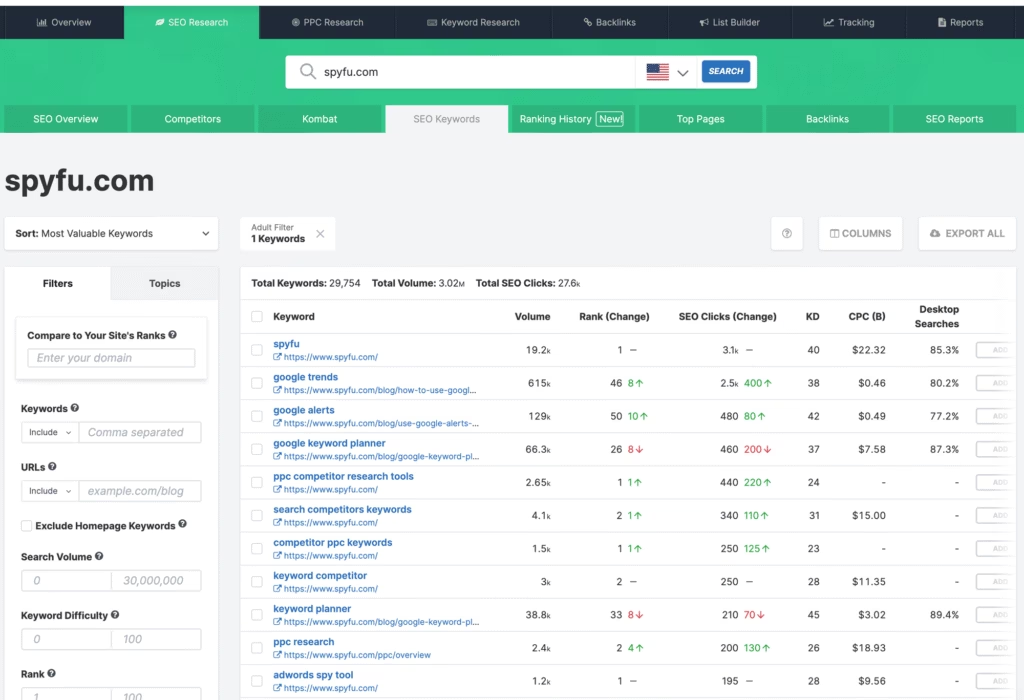
SpyFu enables automated competitor gap analysis through API integration. Programs pull keywords from the top 5 to 10 competitors and compare against client campaigns to identify missing opportunities. This proves valuable for quick account audits and strategic planning.
Agencies integrate the SpyFu API into automated workflows that pull competitor keywords regularly and cross-reference against client campaigns. Users export keyword lists for implementation and generate audit reports highlighting missed opportunities based on competitor intelligence. Spyfu keyword research tools are considered solid, but not the best in the industry.
4. Kombat
SpyFu Kombat compares your domain against competitors using a Venn diagram format that visualizes keyword overlaps and gaps. The tool highlights effective keywords while eliminating irrelevant ones for streamlined PPC and SEO strategies. Users select suggested competitors or add their own domains for comparison.
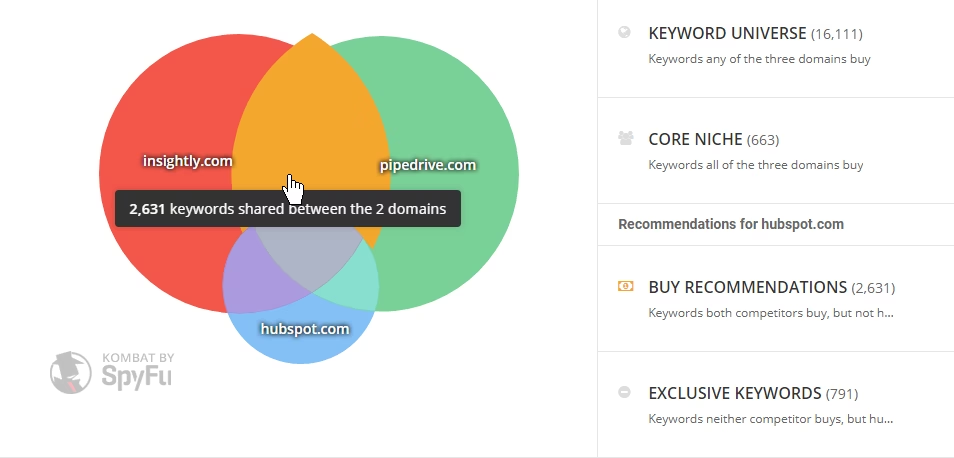
Kombat organizes results into sections (Weaknesses, Keyword Universe, Exclusive Wins, Core Niche). Weaknesses show keywords where competitors rank, but you do not. Keyword Universe displays all keywords that any competitor ranks for. Exclusive Wins reveal keywords you rank for that competitors ignore. Core Niche identifies keywords where all competitors rank, indicating market priorities.
The tool provides market research insights through keyword categorization. The All Keywords section shows terms bought by any competitor. Core Keywords highlight terms that all listed competitors purchase, indicating essential market opportunities.
Kombat delivers specific domain advice through gap analysis. The Consider Buying section reveals opportunities where competitors purchase keywords you miss. Potential Ad Waste identifies keywords you buy that competitors avoid, suggesting possible budget drains. The Content IDeas let you identify opportunities for content creation.
Kombat used to limit the number of domains for simultaneous analysis, but the feature changed in an update, and it is now possible to enter as many as you need.
5. Backlink Research
SpyFu takes a different approach to backlink analysis compared to traditional tools that offer backlink profile analysis and extensive filtering options. Instead of overwhelming users with massive datasets, SpyFu streamlines the process by showing you specific links to target directly with simplified workflows.
The platform shows backlinks exclusively from pages that rank in the top 5 for target keywords. This qualification system ensures link quality and reduces the risk of acquiring harmful links that require future disavowal. Users target proven high-ranking pages rather than low-quality directories or spam sites.
The platform filters backlinks by page type, including blogs and forums, then provides contact information for outreach arrangements. This approach suits marketers who prefer targeted link building over broad analysis.
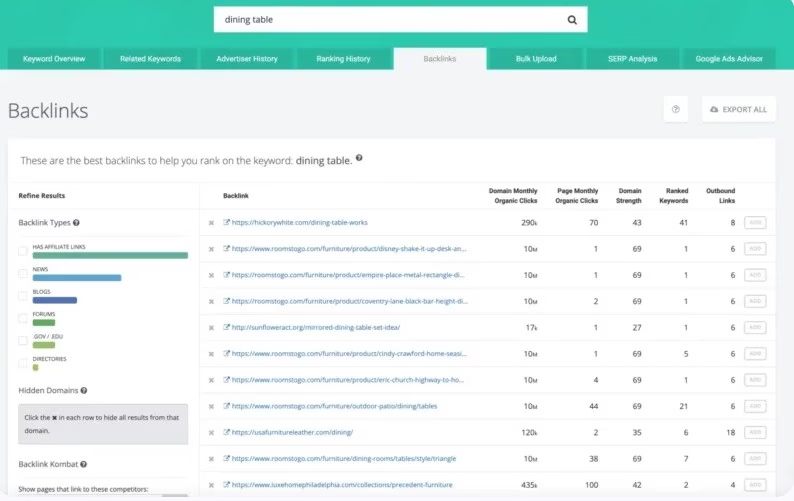
Many marketers prefer this simplified link prospecting. The tool provides direct contact information for outreach, reducing time spent finding decision makers. Others prefer more detailed backlink profile analysis and choose different link building tools.
6. AI Tools
SpyFu offers 2 AI-powered tools for SEO and brand visibility (SpyGPT and RivalFlow). SpyGPT analyzes how ChatGPT and other language models present your brand across 250 million questions.SpyGPT reveals AI mentions and competitor comparisons. Users search brands, topics, or people to identify opportunities for improving representation in large language model outputs.
RivalFlow operates as a content optimization autopilot that spots missing pieces in existing SEO content. The tool analyzes pages against top-ranking competitors to identify gaps preventing higher rankings. RivalFlow generates ready-to-paste improvements with specific placement guidance and provides 23 different enhancement methods. Users receive copy-ready content with precise insertion instructions. RivalFlow integrates with Google Search Console to track before-and-after results.
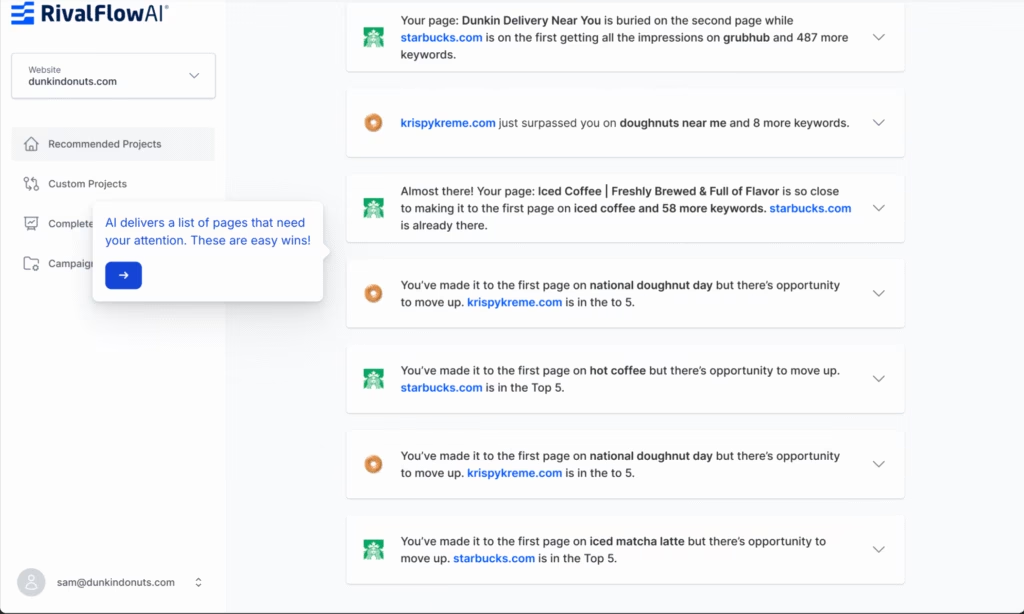
Users start with SpyGPT by searching brand names to see AI model mentions and comparing them against competitors. They identify representation gaps and develop strategies to improve brand visibility in language responses. For RivalFlow, users input URLs or target keywords to receive specific improvement recommendations, implement ready-to-paste suggestions, and monitor ranking improvements.
7. Rank Tracking
SpyFu provides unified rank tracking for SEO and PPC keywords. The platform organizes keywords into trackable projects with custom group names or suggested labels. Users track rankings at the keyword and group levels through convenient site shortcuts.

The system delivers weekly updates, while some other tools provide real-time or on-demand updates, which many marketers find more useful. SpyFu tracks every ranking and ad position at the individual keyword level, and it focuses on historical performance and trends.
SpyFu integrates rank tracking with backlink analysis, competitor monitoring, and keyword research tools. Users create separate projects for different campaigns, clients, or keyword sets while maintaining distinct tracking for each initiative. The unified dashboard combines keyword research, saving, and performance monitoring.

Users start by creating tracking projects and adding researched keywords through site shortcuts. They organize keywords using custom groups or platform suggestions, monitor updates, and analyze historical data to identify performance trends.
8. Reporting
SpyFu reporting tools generate client-ready reports that summarize SEO, PPC, and competitive data. These reports come in PDF format and pull directly from SpyFu’s live data, preserving charts, graphs, and rankings without requiring manual input. The “Create Report” button appears on most overview pages, allowing users to build a document with just a few selections. Each report includes sections such as keyword performance, backlink analysis, ad test history, and domain-wide overviews. Users check or uncheck sections to control the focus.

The reports serve both internal strategy and external client communication. They present actionable data, highlight opportunities competitors exploit, and track changes in visibility or ad strategy over time. SpyFu reporting tools are solid and highly customizable, but not its most well-known feature.
9. Lists and Leads
SpyFu provides tools that help users build targeted lists of business leads by filtering domains based on keywords, industries, locations, ad budgets, and SEO traffic. The Business Leads tool allows users to find contacts within specific niches, offering detailed contact information such as phone numbers, emails, and social media profiles.

Users filter leads by contact type, technology used on websites, and location, then export the data as CSV files. Export limits depend on the subscription plan. SpyFu offers domain lists that include key performance indicators like ad spend, organic search results, and monthly clicks. These lists help identify profitable audiences and competitors, supporting focused prospecting and outreach efforts.
How does SpyFu Tool Work?
SpyFu works as a cloud-based tool that collects search data through large-scale web scraping. It scans Google’s organic results and paid ads to track keyword rankings, ad activity, and backlinks across over 100 million domains. The platform indexes this data by keyword and domain, linking it to search volume, cost-per-click, rankings, and history.
Users search by domain, keyword, or URL to view SEO rankings, PPC history, backlink sources, and keyword gaps. SpyFu shows ad copy, rank changes, and competitor overlaps through a browser interface. Its Kombat feature compares domains, and reports are exported as PDFs. All data collection and analysis happen in the cloud.
How Accurate is Spyfu SEO Tool?
SpyFu is accurate for identifying historical keyword rankings, ad copy, and competitor strategies but it prioritizes trend accuracy over real-time precision. SpyFu captures real Google search results, including the top 100 organic rankings and paid ads. It stores this data with cached pages and screenshots, creating a 15-year archive, with some data as old as 18 years.
The platform tracks keyword rankings, ad copy, and landing pages over time. Ad budgets, clicks, and search volume come from Google and other sources. These numbers serve as consistent benchmarks across competitors. SpyFu uses the same method for all domains, which keeps comparisons reliable.
What Pricing Plans Does SpyFu Offer?
SpyFu offers two main pricing plans with monthly and annual billing options.. All plans include unlimited access to US and international data with a 30-day money-back guarantee and easy cancellation options.
The Basic plan costs $39 monthly. This plan includes 10,000 row search results and data exports, 100 domain overview PDFs, 6 months of historical data, 250 sales leads and domain contacts, 5,000 weekly tracked keyword rankings, and one user seat with additional seats at $15 each.
The Professional plan costs $79 monthly. This plan provides unlimited search results and data exports, unlimited domain overview PDFs, over 10 years of historical data, 500 sales leads and domain contacts, 15,000 weekly tracked keyword rankings, API access, and one user seat with additional seats at $30 each.
Both plans include the same core features, like domain searches, keyword searches, backlink searches, competitor results, keyword group results, domain comparisons, exports, and top lists. The Professional plan adds advanced sales lead filtering, custom keyword tracking, SEO ranking monitoring, 15 years of historical data, custom-branded reports, API access, and user account support.
What is the SpyFu Rating?
SpyFu reviews vary across major software review platforms, with an average rating of 4.3 out of 5. The ratings from top sources are listed below.
- Trustpilot. 4.2 /5 (158 reviews)
- TrustRadius. 6.9/10 (131 reviews)
- Capterra. 4.5/5 (144 reviews)
- G2. 4.6/5 (513 reviews)
SpyFu receives solid ratings across review platforms. However, as a specialized competitor intelligence tool, users frequently need to supplement it with additional SEO tools.
What are the Pros of SpyFu?
The pros of Spyfu include its affordability and competitor research capabilities. The main SpyFu pros are listed below.
- Affordable Plans. Entry-level pricing makes the tool available to freelancers and small businesses.
- User-friendly Interface. Simple dashboard and clean layouts make the tool easy to navigate, even for beginners.
- Strong PPC Tools. SpyFu reveals competitor ad history, spending, and copy, helping users refine paid search strategies.
- Unlimited Data. Unlike many tools with query limits, SpyFu offers unrestricted access to data on all plans.
- In-depth Competitor Research. The tool reveals keyword rankings, ad data, and backlink profiles to provide a full view of competitor performance.
SpyFu offers strong value for users focused on competitive intelligence and PPC planning. It delivers deep keyword and ad research features, though it lacks advanced SEO auditing and content tools.
What are the Cons of SpyFu?
The cons of SpyFu revolve around its limited SEO capabilities, data precision, and lack of detailed backlink profile analysis. The cons of SpyFu are listed below.
- Limited Backlink Analysis. The tool reports backlinks but lacks an in-depth profile analysis option.
- Limited SEO Functionalities. SpyFu does not include technical site audits, content optimization tools, or local SEO features.
- Lack of Real-Time Data. Keyword rankings and traffic estimates update weekly or monthly, which limits immediate insights.
- Inaccuracies in PPC Data. Ad spend and click estimates rely on estimates, which reduces precision.
- Outdated Report Visualization. PDF exports and dashboard visuals lack modern design compared to newer tools.
- Limited AI Tools. SPyFu has RivalFlow and SpyGPT, but lacks more modern AI and automation tools.
- Limited Regional Data. Spyfu includes data for 26 countries, with some competitors offering many more.
SpyFu works well for affordable competitor research but falls short for users who need a full-suite SEO solution. Its limitations become more noticeable on large-scale campaigns that require deeper technical SEO and site audit features, backlink management, or content optimization.
What do Reddit Users think about SpyFu?
According to Reddit users, SpyFu has developed a reputation as a competent mid-tier SEO tool that occupies a specific niche in the market. The platform is generally viewed as a practical choice for marketers operating with limited budgets.

SpyFu’s reputation centers around being a “good enough” solution that delivers functional results rather than exceptional performance. Users tend to approach it with measured expectations, recognizing it as a tool that provides value within limitations rather than a comprehensive solution. This positioning has created a user base that appreciates its cost-effectiveness while remaining realistic about its capabilities.

The tool faces credibility challenges regarding data accuracy, particularly outside the US market, which has led to a somewhat cautious user sentiment. Some users adopt a “wait and see” approach, testing the platform over extended periods before making long-term commitments.

SpyFu’s reputation reflects a tool in transition, with newer AI features like RivalFlow receiving lukewarm reception. Users view these additions as promising but underdeveloped, contributing to an overall perception of SpyFu as a platform still finding its footing in advanced SEO capabilities.

The consensus portrays SpyFu as a reliable secondary option rather than a primary choice, suitable for specific use cases like Google Ads research, while falling short in areas like comprehensive keyword analysis. This has established its reputation as a specialized tool rather than an all-in-one solution.
How does SpyFu treat its long-term subscribers?
SpyFu offers a 30% annual discount and provides lifetime discounts for users who subscribe through RivalFlow AI. Long-term subscribers benefit from flexible billing with no contracts or hidden terms. Cancelations are simple and accessible via email, live chat, phone, MyAccount page, Facebook, or X.
How responsive is SpyFu’s customer support?
SpyFu offers live chat and phone support from 6 a.m. to 5 p.m., Monday through Friday. Many users describe the support team as helpful and quick to respond. However, others mention issues such as delayed replies, billing errors, and challenges during cancellations. Support remains unavailable outside working hours, which limits access. SpyFu’s help center provides guidance and resources when live assistance is offline.
How Reliable and Legit is SpyFu as an SEO Tool?
SpyFu is a well-known, reliable, and legitimate SEO and PPC tool that has been around since 2006. Its practices are transparent, and users do not report more issues compared to other competitive research tools.
What is the Best Alternative to SpyFu Tool?
Search Atlas is the best alternative to SpyFu as a complete SEO solution for marketers and agencies who need deeper data, faster execution, and less manual work. SpyFu focuses on keyword and PPC insights, but Search Atlas covers more. Its keyword tools support full content planning, SERP-based comparisons, and regional segmentation. OTTO SEO, the AI SEO agent, fixes on-site issues directly. The backlink analyzer includes data from 100 trillion links. Users access competitors’ top keywords, PPC strategies, and backlink sources in one place, with automatic competitor identification and topical dominance tools.
Search Atlas supports outreach, PPC competitor research, automatic Google Ads management, content workflows, on-page, technical, local SEO and automation. Migrate from SpyFu to Search Atlas to prioritize speed, multi-channel execution, and tool consolidation.
Are there any other SpyFu Alternatives?
Yes, there are other Spyfu alternatives. SpyFu alternatives include Mangools, Moz Pro, Semrush, SE Ranking, and Serpstat. While these tools offer more comprehensive capabilities, most SpyFu alternatives lack a unified system that combines keyword research, AI content creation, automated SEO fixes, backlink analysis, PPC optimization, and outreach tools in one streamlined platform.
Do SEO professionals rank SpyFu among the Best SEO Tools?
Yes, SEO professionals rank SpyFu among the best SEO tools for competitor research, though it serves as a specialized tool and requires support from other platforms for a complete SEO workflow.









